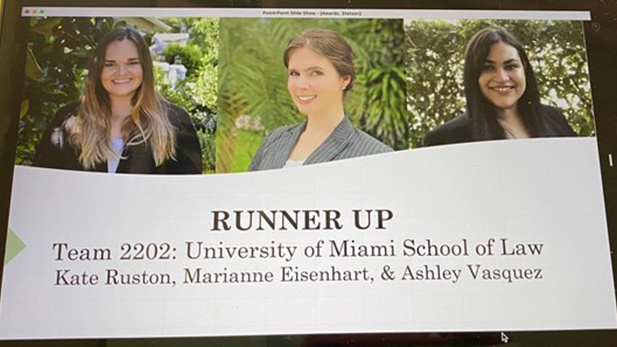
Since its founding over a decade ago, the International Moot Court Program has represented Miami Law in competitions worldwide, spanning areas of law as diverse as human rights, commercial arbitration, and international criminal law.
This year marked the program’s inaugural entry in the International Environmental Moot Court Competition, the world's largest moot court competition devoted exclusively to the global environment, a timely entry with the law school's recent launch of its Environmental Law Program.
Miami Scholar Ashley Vazquez, 3L, Kate Ruston, 2L, and Marianne Eisenhart, 3L and HOPE Fellow, led the charge in representing Miami Law for the first time in the competition’s 25-year history, with the team emerging second in the North American rounds, hosted virtually by the University of Illinois Chicago School of Law on February 3-5, 2022. As a top team, Miami Law will head to the finals in April of this year.
“I enrolled in the International Moot Court Program because of my interest in international human rights law, and after hearing about Professor Arias’ dedication to transforming law students into future litigators,” says Ruston, referring to Director Paula Arias, who plays an active role in coaching each of the program’s teams. “Throughout the seven months I worked with Professor Arias and my team, I grew as an oralist, writer, advocate, and future lawyer. I have already seen the positive impact of the program on my ability to write, argue, and present in my other classes and legal work.” Ruston is also a Miami Scholar.
Founded by Stetson University College of Law in 1996, the International Environmental Moot Court competition has other regional and national rounds in Africa, Brazil, Colombia, India, Ireland, Mexico, South Korea, and the Philippines, with the top teams advancing to the international finals hosted at Stetson Law each spring.
This year’s competition saw students arguing both sides of a conflict in a low-income community between fostering much-needed economic development and protecting natural environment resources. Teams also used international legal principles to argue about the protection of wetlands during armed conflict. Like many international moot court competitions, students were required to develop a deep understanding of various legal doctrines and systems and exercise their skills in research, writing, and oral argument.
“The experience I gained from collaborating with teammates with different life experiences and approaches to work helped me become a better advocate, researcher, and writer,” says Vazquez, who cites her experience as a steppingstone towards a post-graduate position at Department of Housing and Urban Development’s Office of General Counsel. “The tension between economic growth and sustainability is something I have always been interested in from an environmental justice lens. I have no doubt it will continue to be a theme in my career.”
Read more about Miami Law’s International Moot Court Program
Read more about studying Environmental Law at Miami Law

